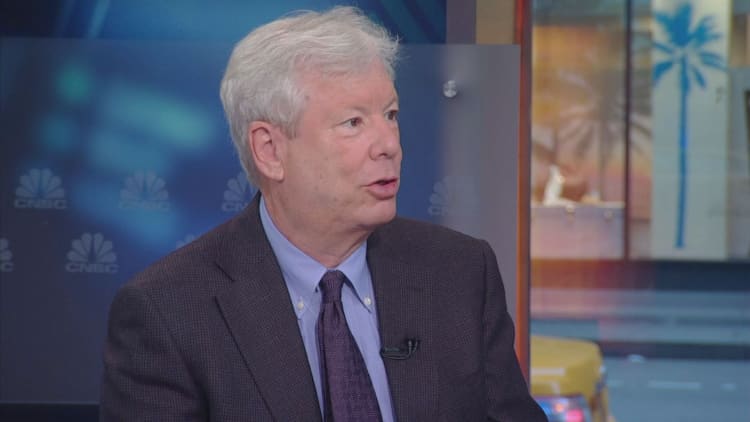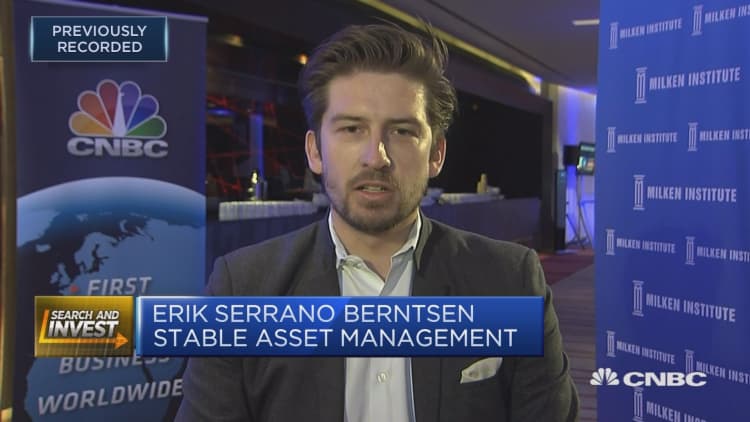Selecting the right candidate for a specific role is challenging for any business, and that's especially the case in an industry as volatile as how finance can be.
Senior management at one investment company, however, knows exactly what criteria they have in mind when it comes to selecting future hedge fund managers.
"We focus on specialist managers in London and New York and we're looking for the younger, hungrier hedge fund managers," Erik Serrano Berntsen, CEO and co-founder at Stable Asset Management, told CNBC last week.
"We think the more established names perhaps give you a feeling of safety. But why should you be investing with people who have already been successful, are probably quite rich and are probably wanting to do other more interesting things with their life?"
The CEO said investors should consider the longevity of individuals managers. For instance, what is a manager's incentive to perform? Is there a legacy program in place for other managers to take over the reins of a project?
Stable Asset Management is an investment firm that looks at building "world-class asset management firms," while supporting and financing the launch of new funds.
Switching its focus to "younger, hungrier" managers results in hedge fund seeding firms, such as Stable, putting a lot of weight on a candidate's background. To do this, the company applies a simple three-step framework called "Past, Present and Future."
Speaking on the sidelines of the 2017 Milken Institute London Summit, Berntsen gave examples for each stage as to what key criteria Stable uses to select candidates.
- PAST: Where do these potential managers came from? Do they hail from a slightly less wealthy background? Are they really hungry for the role?
- PRESENT: The firm asks candidates about their work-life balance. How many hours do they work? How long do they typically sleep for? Are things at home going smoothly?
- FUTURE: Determining a candidate's prospects, the company asks questions such as "What kind of business do you want to build?" and "What kind of culture do you want to build?"
Berntsen said: "We want someone who wants to be proud of their firm and who aren't only in it for the money. Of course, making money is a great side effect of the hedge fund industry, but we want someone who's really passionate about what they do."
It's not only these attributes that Stable is on the lookout for when it comes to hedge fund manager selection — successful candidates also tend to be "slightly more volatile managers," the CEO added.
We want someone who wants to be proud of their firm and who aren't only in it for the money.Erik Serrano BerntsenCEO at Stable Asset Management
"Historically, people thought diversification was the way to a less volatile portfolio — and that's true to some extent, but I think the crisis showed that a lot of the things we thought were de-correlated in a portfolio, end up being correlated in periods of stress, which is when you most need diversification."
"So there's been a trend in the industry more recently for more concentrated portfolios, people want less positions in their book and that's both applicable at position level but also at manager level. So a firm like ours, who backs managers and builds businesses around them, wants each manager not to be too diversified, so that they can actually bring some volatility to the portfolio."
The importance of staying ahead of the game
In Ernst & Young's (EY) recently published 2017 Global Hedge Fund and Investor Survey, the consultancy found that 57 percent of hedge fund managers surveyed were embracing innovation to improve their operational efficiency and broaden their asset base, to avoid falling behind competitors and to tackle industry challenges such as disruptions to the marketplace.
In fact, in the same survey, around a third of investors said they wanted managers to embrace innovation in the front office, recognizing the importance of staying ahead and using advanced data.
"The pace at which the hedge fund industry is being disrupted continues to accelerate, as advances in technology bring new threats, but also opportunity," Michael Serota, EY global hedge fund services leader, noted in a release accompanying the survey, published last month.
"The evolving landscape forces managers to not only be reactive but also proactive in identifying novel solutions that allow them to deliver alpha and remain competitive. Managers of all sizes are embracing innovation to stand out in a crowded hedge fund universe and to achieve a common strategic objective: growth."
Like this story? Like CNBC Make It on Facebook.
Don't miss:
9 ways to build a side business without quitting your day job
5 ways to become a master negotiator
Why Tim Ferriss says hearing the word 'no' sets you up for success




